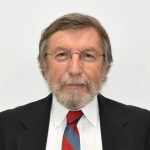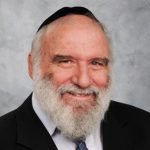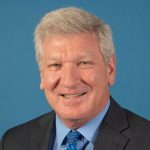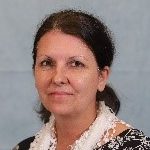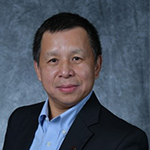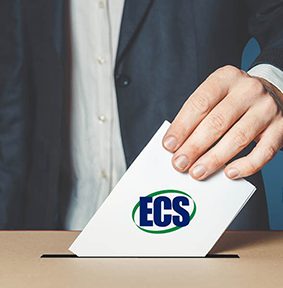 The early months of each year are an exciting time at ECS as officer elections take place during the months of January through March. Elected officers constitute the organization’s executive committee and include the following positions: president, three vice presidents, secretary, and treasurer.
The early months of each year are an exciting time at ECS as officer elections take place during the months of January through March. Elected officers constitute the organization’s executive committee and include the following positions: president, three vice presidents, secretary, and treasurer.
We vote for the new President, Third Vice President, and Treasurer in this election.
The following are biographical sketches and candidacy statements for all candidates.
Candidate for President
Turgut Gür
Turgut Gür is an adjunct professor of materials science and engineering at Stanford University. He recently retired after a career spanning more than three decades that included providing leadership to three major multi-disciplinary team- and theme-based research centers on campus focused on energy and advanced materials. He also holds a Visiting Professor appointment from the Chinese University of Mining and Technology-Beijing (CUMTB), and an International Mentor appointment from the Norwegian University of Science and Technology (NTNU).
He is a Fellow of The Electrochemical Society and recognized leader in high temperature electrochemical energy research, materials, and technologies with 11 U.S. patents and more than 160 publications. He completed BS and MS degrees in Chemical Engineering at the Middle East Technical University, and three graduate degrees including a PhD in Materials Science and Engineering at Stanford University.
An active member of ECS since 1973, Prof. Gür previously assumed leadership positions in the Society. He served on multiple ECS advisory boards and committees, as well as the ECS Board of Directors and Executive Committee. Formerly, Prof. Gür was Chair of the ECS High-Temperature Energy, Materials, & Processes (H-TEMP) Division. He co-organized 17 ECS symposia and co-edited their ECS Transaction volumes. Previously, he served for three separate terms over 10 years on the Board of the International Society for Solid State Ionics (ISSI) and was an Associate Editor of the Journal of the American Ceramic Society for 12 years.
Statement of Candidacy
Increasing trends in climate change and global warming present arguably an existential challenge to Earth’s ecosystems and are intimately linked to our thirst for energy and electricity currently provided primarily by fossil fuels. The 2021 United Nations Climate Change Conference (COP26) in Glasgow, Scotland, has shown how difficult it is to achieve mutual agreement to tackle these complex issues head on. However, clean water, clean air, and healthy environment are critical for us all. Most of the scientific activities we are engaged in involve charge separation and recombination phenomena at interfaces and junctions, which are central to clean water, clean environment, and clean energy production, conversion and storage. Hence, as ECS members, we are ideally positioned to exploit this unique leverage and advance clean technologies towards meeting the world’s demands while curbing the upward trend of global warming.
If elected, I will lead ECS to serve as the global hub for science and discovery that contributes to sustainable solutions for global challenges. This will involve engaging our members in cross-disciplinary activities; publicizing our members’ groundbreaking discoveries to the public; collaborating with our international counterparts; and creating opportunities for industry leaders and policymakers from around the globe to join our biannual meetings and help bridge the gap between science, policy, and technology. We also need to educate and train the public through ECS webinars and short courses by our expert members.
As an international Society, I recognize the need for ECS to be more engaged with our international community and explore programs that benefit all. Global challenges can only be resolved by international collaborations on complex problems. While we continuously need to provide an intellectually stimulating and scientifically vibrant home to our more than 8,000 dedicated members from more than 85 countries, we also need to invest heavily in students and young scientists from across the globe to help them prepare for leadership positions in their fields and our Society. If elected, I will help generate resources for young scientist to attend ECS meetings and expand international and national student chapters to help increase ECS membership among young scientists.
On a personal level, ECS has been a home and an integral part of my professional life since 1973. I have always valued the stimulating and informative environment of ECS meetings and feel fortunate to have built many valued and lasting friendships. It is indeed an honor for me to be considered for this prestigious position to further serve you and our esteemed Society.
I hope to see you all in Vancouver in May.
Candidates for Third Vice President
Doron Aurbach
Doron Aurbach is a professor in the Department of Chemistry at Bar-Ilan University (BIU) where he leads the Energy & Sustainability Center. He founded the BIU electrochemistry group in October 1985 and leads this team of 40 people. Prof. Aurbach chaired the Chemistry Department from 2001-2005. Under his supervision, 65 PhD and 80 MS students have graduated. From 2010-2016, he served as Chair of the Israel National Labs Accreditation Authority. He heads INREP, the Israeli National Research Center for Electrochemical Propulsion. Founded in 2012, INREP brings together 25 research groups and seven Israeli universities to develop power sources for transportation.
Aurbach’s group develops new battery systems for electro-mobility and large energy storage for sustainable energy and water purification, desalination, and disinfection technologies. They are establishing all the necessary basic scientific background required for practical achievements including the development of a variety of in situ spectro-electrochemical methodologies; studies of non-aqueous electrochemical systems; new solution chemistries; and understanding the correlation among electrochemical response, structure, morphology, and surface chemistry of a large variety of useful electrodes’ materials, thus keeping an optimal balance between practical and basic studies. The group collaborates actively with leading international industries including Nichia, cATL, BASF, and GM.
Prof. Aurbach has published more than 730 peer-reviewed papers in electrochemistry, physical chemistry, energy research, and surface and materials science, with nearly 80,000 citations and an h-index of 137 (as of October 21, 2021). He serves as Technical Editor of the Batteries and Energy Storage (BES) technical area for the Journal of The Electrochemical Society (JES). He is a Fellow of The Electrochemical Society, Materials Research Society, and International Society of Electrochemistry. He received prestigious prizes and awards including the 2020 Israel Chemical Society Gold Medal; 2018 Eric and Sheila Samson Prime Minister’s Prize for Innovation in Alternative Fuels for Transportation; 2018 International Society of Electrochemistry Alexander Frumkin Medal;; and 2014 International Battery Association Ernest B. Yeager Award. The Electrochemical Society presented Prof. Aurbach with the 2017 Allen J. Bard Award; 2013 Battery Division Research Award, and 2005 Battery Division Technology Award.
Statement of Candidacy
I have been an active member of ECS since October 1983, have taken part in dozens of ECS meetings, and contributed scientifically to the electrochemistry community by pioneering several fields connected to energy storage and conversion and the basic science needed to promote them. I have educated more than 200 senior scientists in the field of electrochemical science, many of whom hold senior positions in academic institutions and industries today.
From 2003 to 2012, I served as Associate Editor for Electrochemical and Solid-State Letters, aiding in quick and prompt publications. In 2011, I joined JES as an Associate Editor. Since 2015, I have served as the Technical Editor for Batteries and Energy Storage (BES), handling—with five excellent and dedicated associate editors—almost 1000 papers per year. I believe that we succeed in keeping JES a leading electrochemical journal, elevating its scientific level, yet helping young scientists in their careers, being strict but educational and helpful. I have an excellent network in the electrochemistry community, collaborating intensively with dozens of research groups throughout the world on all five continents. I also collaborate intensively with important industries including Nichia, CATL, BASF, and GM. At home, I founded and lead INREP, the Israeli National Research Center for Electrochemical Propulsion which brings together 25 prominent research groups and seven Israeli universities to collaborate rather than compete.
If elected to any official position in The Electrochemical Society, I will do my best to bring with me this spirit of collaboration and work toward increasing the level of collaboration and flow of information within our community. We face immense global challenges related to our energy policies and economies. We suffer from dangerous and disastrous climate changes in recent years that demand that we invest great efforts in sustainability, the massive use of renewable energies, and consequently develop new technologies for large energy storage and conversion. Here, electrochemical science is at the forefront of the necessary global efforts. My mission will be to unify efforts toward developing better energy technologies, promoting young scientists, and establishing stronger collaborative relationships among national scientific communities as gateways to peace.
James M. Fenton
James M. Fenton is Director of the University of Central Florida’s FSEC Energy Research Center and Professor of Materials Science and Engineering. He leads more than 50 faculty and staff who research, develop, and evaluate clean energy technologies, and educate the current and future workforce about technology innovations. FSEC has six major program areas—solar energy, high performance buildings, alternative transportation, advanced energy systems, STEM education and workforce training, and energy policy research.
Professor Fenton has more than 40 years of experience in electrochemical engineering and education topics including redox flow batteries, PEM fuel cells, Solar-to-PEM electrolyzer system analysis, fuel processing, high temperature corrosion, oxidizing agent generation, and metal recycling. He has been a member of ECS for 40 years, attending his first meeting as a student in 1982.
During Professor Fenton’s tenure as Secretary of The Electrochemical Society (2017-2021), he chaired the 2018 search committee that hired Christopher Jannuzzi as ECS’s Chief Executive Officer. He has also served the Society in other capacities, including all offices of the ECS Boston Section (now the ECS New England Section) and the ECS Industrial Electrolysis and Electrochemical Engineering Division. His service includes membership in Society committees: Executive Committee, Board of Directors, Council of Local Sections, Individual Membership, Finance, New Technology, Interdisciplinary Science & Technology Subcommittee, Publication, Education, Ethical Standards, Technical Affairs, and Ways and Means.
Professor Fenton chaired the ECS student poster sessions for four years, and has chaired the Polymer Electrolyte Fuel Cells Student Poster Session competition since its inception in 2011. He received the honor of Fellow of The Electrochemical Society in 2007 and ECS’s Energy Technology Division Research Award in 2014 for his work on proton exchange membrane fuel cells.
Statement of Candidacy
It is an honor to be a candidate for Vice President of The Electrochemical Society, and if elected, I look forward to the opportunity to serve our “member-driven” society of world-class researchers from industry, academia, and government. In 2017, when I first began my term as ECS Secretary, meetings and high-quality journal publications were the primary way many of us communicated with each other. In 2020 the COVID-19 pandemic led to the uncertainty of hosting live meetings, and declining membership and industrial participation. The Society responded to this global crisis by holding the 2020 PRiME Meeting, the 239th ECS Meeting and, at the last moment, the 240th ECS Meeting as digital meetings that allowed free attendance and engagement to those that might not have normally attended. Each of these meetings reached more participants than we would have had for a typical in-person meeting. The 2020 PRiME meeting had the highest registration in ECS history with 1,200 student presenters from around the world.
We will now communicate our research through digital and in-person hybrid meetings as well as through social networking sites, open access journal articles, videos, webinars, and podcasts. It is through all of these communication platforms that the members of ECS will inspire our future members (college students, both at the undergraduate and graduate level, and pre-college students) to choose careers in electrochemical and solid state research. This future workforce will, with our help, develop the technologies that tackle important problems related to energy, health, education, the environment, national security, global development and climate change. Most of us believe that climate change is a larger crisis than the COVID-19 pandemic. ECS is uniquely positioned to mitigate climate change through rapid decarbonization by direct and indirect electrification of energy producing and manufacturing processes. This will allow the world to limit the long-term increase in average global temperatures to 1.5oC by 2050.
To promote awareness of technical developments in electrochemistry and solid state science at the precollege level, I will encourage divisions and local sections, student chapters, and corporate affiliate members to work with regional education systems to provide educational tools for K-12 teachers. It is through this type of service that knowledge of electrochemistry and solid state science research carried out by members of ECS can be disseminated to the general public so they too can be active in mitigating climate change.
As Vice President of ECS, my commitment is to cooperatively work with each of you, the officers, and our outstanding professional staff to define and implement new visions and new initiatives to enable our members and future members to solve the global grand challenges.
Candidates for Treasurer
Elizabeth (Lisa) J. Podlaha-Murphy
Elizabeth (Lisa) J. Podlaha-Murphy is Department Chair of the Chemical and Biomolecular Engineering Department at Clarkson University. Her research experience and expertise lies in the area of electrodeposition of novel alloy and composite materials for a variety of applications including water splitting for hydrogen generation, corrosion resistant surface coatings, nanostructured materials for micro and nanodevice components and in modeling battery and electrochemical systems.
Dr. Podlaha received her BS in Chemical Engineering in 1986 with a concentration in materials science with an Honor’s program distinction, followed by an MS and employment at IBM. Inspired by her IBM colleagues doing cutting-edge research, she returned to school, earning a PhD from Columbia University, in chemical engineering. She completed a postdoctoral position at the École Polytechnique Fédérale de Lausanne, Department of Materials Science. Her first academic appointment was at Louisiana State University as an Assistant/tenured Associate Professor in Chemical Engineering (1998-2007), and at Northeastern University as a tenured Associate/full Professor (2007-2017). As part of NSF, DOE, NIH, and DARPA funded projects, including the NSF CAREER Award, Dr. Podlaha has directed 26 graduate (20 PhD and 6 MS) and over 40 undergraduate students in electrochemical research in the lab. She has authored or co-authored 84 peer reviewed journal publications (half of those in the ECS Journal of The Electrochemical Society and Electrochemical and Solid State Letters), 24 proceedings papers, one book chapter, and four patents. She was past Chair of the ECS Electrodeposition Division (ELDP) (2015-2017), and held all of the preceding officer positions in that division: Member at Large, Treasurer, Secretary, and Vice Chair. Dr. Podlaha served on many Society committees including the Membership Committee, and organized, chaired, and co-chaired symposia. In 2019, Dr. Podlaha helped co-advise a newly formed ECS Student Chapter at Clarkson University.
Statement of Candidacy
As a member of ECS since 1987, I have had the good fortune to witness the rise of electrochemical and solid state science and technology on a global scale enabled by my ECS membership. I feel that ECS has been at the forefront of providing leading science and engineering content in timely electrochemical and solid state topics, and providing venues for sharing ideas and networking, often from the roots up as represented by the many ECS divisions. It should be the go-to premier resource for current and future members, as well as non-members. As we emerge from the pandemic, Open Access and the Free the Science initiative are ever more relevant, as scientists and engineers around the world have now embraced an online working environment. Some of the lessons learned are that information access is not constrained anymore by physical means. To continue this growth, the following are all important: enhancing membership and participation at meetings and webinars; increasing quality submission of work in ECS publications; furthering outreach activities; and increasing awareness of what ECS has to offer. Balancing a budget that directs these activities and enhances the Society’s reputation is a challenge I look forward to taking on.
My own journey with the Society started in the ECS Battery Division as a graduate student when I received the 1991 Battery Division Student Research Award. During my career, my research moved in the direction of electrodeposition, offering me a myriad of opportunities to examine different applications enabled by electrodeposition. This background has helped shape my knowledge of electrochemical science and engineering in a broader direction. With this perspective, I feel I am well suited to jump on board the Society’s leadership team with a holistic view. As a current department chair at a research activity university, I have experience in budget management and planning. I value candid, clear, and consistent communications for a seamless and healthy operations of the treasurer position. As your ECS Treasurer, I will earnestly work towards building a solid and enduring future for the Society.
Dr. Nianqiang (Nick) Wu
Dr. Nianqiang (Nick) Wu is currently Armstrong-Siadat Endowed Chair Professor in Materials Science at the University of Massachusetts (UMass) Amherst. He received his PhD in Materials Science & Engineering from Zhejiang University. He was a Postdoctoral Research Fellow at the University of Pittsburgh from 1999 to 2001. After that, he directed the Keck Surface Science Center at Northwestern University from 2001 to 2005. He then joined West Virginia University as Assistant Professor in 2005, and was promoted to Associate Professor in 2010, Full Professor in 2014, and Berry Chair of Engineering in 2019. Dr. Wu joined UMass Amherst in 2020.
Dr. Wu is a Fellow of the Electrochemical Society and the Royal Society of Chemistry. He received the ECS Sensor Division Outstanding Achievement Award, the Benedum Distinguished Scholar Award, and the Alice Hamilton Award for Excellence in Occupational Safety and Health. He serves as Associate Editor and on the editorial advisory board for international journals.
Dr. Wu’s research interest lies in fundamental studies on charge and energy transfer in electrochemical and optoelectronic materials and devices, and transformation of discoveries to photoelectrochemical cells, electrochemical energy storage devices, biosensors, point-of-care testing devices, and precision medicine. A Clarivate Analytics Highly Cited Researcher, he authored or co-authored 195 journal articles, three book chapters, and the book titled Biosensors Based on Nanomaterials and Nanodevices. His papers were cited over 25,000 times with an h-index of 72.
Over the past decade, Dr. Wu served as Chair, Vice Chair, Secretary, and Treasurer of the ECS Sensor Division as well as Member at Large of that division and the ECS Energy Technology Division. He served on multiple society-level committees including Ways and Means, Honors & Awards, and the De Nora Award Subcommittee. He chaired the ECS Fellows Election Subcommittee and Henry Linford Award Subcommittee. Dr. Wu served as Advisory Board Member for ECS Interface and Guest Editor for special issues of the Journal of The Electrochemical Society and Interface. From 2010 to 2020, he was lead organizer for the biannual Symposium on Photocatalysis and Solar Fuels; ad hoc Symposia on Biosensors and Point-of-Care Testing Devices; and Session Chair for several symposia in every ECS meeting.
Statement of Candidacy
It is my great honor to be a candidate for Treasurer of the Society that encompasses more than 8,000 members from over 85 countries. The Treasurer’s responsibilities are to ensure the continuing growth of ECS through sustainable growth of its assets, efficient use of financial resources, and to ascertain that the resources are allocated to support activities that advance the mission and retain the sustainability and dynamics of the Society. The membership itself is the most important part of the Society. It is essential to recruit new members and retain existing members, and continue to serve the members’ professional needs and interests. Especially, the Society must continue to actively recruit underrepresented groups to champion strategies of Diversity, Equity, and Inclusion (DEI). We can also allocate resources to recruit more international members to facilitate collaborations and interactions worldwide. Humanity is facing grand challenges worldwide in climate change, food and energy sustainability, as well as public health crises such as the COVID-19 pandemic. Expansion of the international membership will allow the Society to harness the workforce required for the efforts to tackle these worldwide challenges. In addition, we can continue to increase financial support to student members, for example, facilitating the establishment of new student chapters, assisting in the operation of student chapters, and supporting students with travel grants for ECS meetings. We can also facilitate the establishment of more awards to recognize members’ career accomplishments, outstanding service, and leadership.
Symposia are not only forums for disseminating data and catalysts for new scientific discovery and technology development, but also platforms for members and peers to networking. We can allocate resources to each symposium to promote attendees’ interactions, networking, and engagement with the Society. Besides regular symposia operated by different ECS divisions, we can allocate resources to encourage society-level interdisciplinary symposia that place an emphasis on grand challenges in climate change, food and energy sustainability, public health crises, etc. We can co-sponsor international meetings held by other professional organizations and groups that are focused on these grand challenges. Moreover, we can explore the possibility of holding ECS biannual meetings in Europe, Asia, and other regions, which helps recruit new international members and enhance the impact of the Society worldwide.
The Society created the Free the Science initiative to publish open access articles in ECS journals and make electrochemical and solid state research freely accessible to the general public. ECS has initiatives to launch several new journals that reflect the evolution and progress of science and technology in the electrochemical and solid state research fields. ECS continues to implement DEI best practices. The Journal of The Electrochemical Society (JES) is publishing a focus issue on Women in Electrochemistry. The ECS leadership team must ensure financial sustainability and strong financial support for these publication initiatives.
ECS is my home society where I have met many peers and friends, and that has greatly nurtured my career. In the past decade, I was honored to serve as an officer and on various committees at both the division and society levels. If elected, I will work together with the ECS leadership team, staff, and members to contribute to the Society’s activities and initiatives, and to serve all of you.


